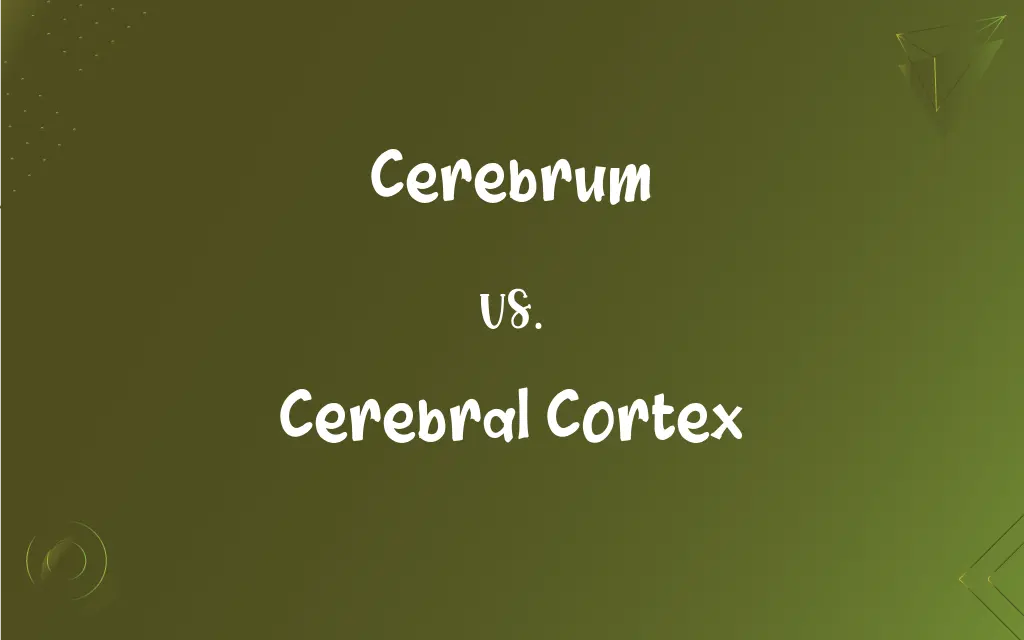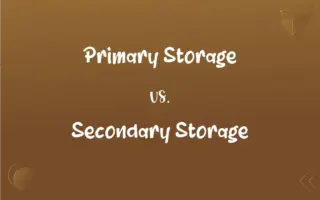Cerebrum vs. Cerebral Cortex: What's the Difference?
Edited by Aimie Carlson || By Janet White || Published on December 29, 2023
The cerebrum is the largest part of the brain, encompassing various structures, while the cerebral cortex is the outer layer of the cerebrum, involved in high-level brain functions.

Key Differences
The cerebrum is the largest and most developed part of the human brain, responsible for complex brain functions. The cerebral cortex, a part of the cerebrum, is a thin layer of gray matter covering the outer portion of the cerebrum.
Structurally, the cerebrum contains the cerebral cortex, white matter, and several other important areas such as the basal ganglia. The cerebral cortex itself is characterized by its highly wrinkled surface, increasing its surface area.
Functionally, the cerebrum integrates sensory information, coordinates voluntary movement, and facilitates cognitive processes like thinking and problem-solving. The cerebral cortex plays a key role in memory, attention, perception, awareness, thought, language, and consciousness.
The cerebrum is divided into two hemispheres, each controlling opposite sides of the body. The cerebral cortex is divided into four lobes: frontal, parietal, temporal, and occipital, each with specific functions.
In terms of development, the cerebrum undergoes significant growth and changes during a person’s life. The cerebral cortex, particularly its prefrontal region, continues to develop into early adulthood, influencing personality and decision-making.
ADVERTISEMENT
Comparison Chart
Part of Brain
Largest part, includes various structures
Outer layer of the cerebrum
Function
Coordinates movement, processes sensory info, cognitive functions
Involved in memory, attention, perception, thought, language
Structure
Includes cortex, white matter, and deep brain structures
Thin layer of gray matter, highly wrinkled
Division
Two hemispheres, each controlling opposite body sides
Four lobes with specific functions
Development
Significant growth and changes over life
Prefrontal cortex develops into early adulthood
ADVERTISEMENT
Cerebrum and Cerebral Cortex Definitions
Cerebrum
Largest Brain Part.
The cerebrum is the most prominent part of the human brain.
Cerebral Cortex
Perception and Awareness.
Our perception of the world is shaped by the cerebral cortex.
Cerebrum
Sensory Integration.
All sensory information is processed in the cerebrum.
Cerebral Cortex
Memory and Attention.
The cerebral cortex is key in forming and retrieving memories.
Cerebrum
Emotional Processing.
The cerebrum is involved in processing emotions and personality.
Cerebral Cortex
Language Processing.
The cerebral cortex is involved in understanding and producing language.
Cerebrum
Cognitive Functions.
The cerebrum plays a crucial role in our ability to think and learn.
Cerebral Cortex
Conscious Thought.
Conscious thought processes occur in the cerebral cortex.
Cerebrum
Motor Coordination.
The cerebrum controls voluntary muscle movements.
Cerebral Cortex
Outer Layer of Cerebrum.
The cerebral cortex is the brain's outermost layer.
Cerebrum
The large rounded structure of the brain occupying most of the cranial cavity, divided into two cerebral hemispheres that are joined at the bottom by the corpus callosum. It controls and integrates motor, sensory, and higher mental functions, such as thought, reason, emotion, and memory.
Cerebrum
(neuroanatomy) The principal and most anterior part of the brain in vertebrates, which is located in the front area of the skull and divided into two hemispheres, left and right, separated by a fissure. In humans it is the largest part of the brain and is responsible for the integration of complex sensory functions and the initiation and coordination of voluntary activity, and the higher mental functions such as consciousness, thought, reason, emotion, and memory.
Cerebrum
The anterior, and in man the larger, division of the brain; the seat of the reasoning faculties and the will. See Brain.
Cerebrum
Anterior portion of the brain consisting of two hemispheres; dominant part of the brain in humans
FAQs
Is the cerebrum the same as the brain?
The cerebrum is a major part of the brain, but not the entire brain.
Does the cerebrum control involuntary actions?
No, the cerebrum mainly controls voluntary actions and cognitive processes.
Is the cerebral cortex only in humans?
No, many animals have a cerebral cortex, but it's most developed in humans.
Are the cerebrum and cerebral cortex visible in all brain scans?
Yes, they're visible in detailed scans like MRI or CT scans.
What happens if the cerebral cortex is damaged?
Damage can affect memory, perception, and other cognitive functions.
Is the cerebrum involved in sleep?
Yes, the cerebrum plays a role in regulating sleep patterns.
What is the main function of the cerebral cortex?
It's involved in high-level functions like memory, attention, and consciousness.
Does the cerebrum include the brainstem?
No, the cerebrum does not include the brainstem.
Can damage to the cerebrum be repaired?
Some cerebrum damage can be mitigated, but many injuries are permanent.
Does the cerebrum grow throughout life?
The cerebrum grows significantly in childhood and adolescence.
Is the cerebral cortex thicker in smarter individuals?
There's some evidence linking cortical thickness to certain aspects of intelligence.
Does the cerebrum process emotions?
Yes, the cerebrum, especially the frontal lobe, is involved in emotion processing.
Does aging affect the cerebral cortex?
Yes, aging can lead to changes in the cortex's structure and function.
Can the cerebral cortex regenerate?
The cerebral cortex has limited capacity for regeneration.
Is the cerebrum the same in all mammals?
No, there's significant variation in size and complexity among mammals.
Are the two hemispheres of the cerebrum identical?
They're similar but have different specializations, like language in the left hemisphere.
Does learning new skills change the cerebral cortex?
Yes, learning can lead to changes in cortical structure and function.
How is the cerebral cortex organized?
It's organized into four lobes, each with specific functions.
Can you live without a cerebrum?
Living without a cerebrum is extremely rare and severely limits function.
What's the role of the cerebral cortex in language?
It's crucial for both language comprehension and production.
About Author
Written by
Janet WhiteJanet White has been an esteemed writer and blogger for Difference Wiki. Holding a Master's degree in Science and Medical Journalism from the prestigious Boston University, she has consistently demonstrated her expertise and passion for her field. When she's not immersed in her work, Janet relishes her time exercising, delving into a good book, and cherishing moments with friends and family.
Edited by
Aimie CarlsonAimie Carlson, holding a master's degree in English literature, is a fervent English language enthusiast. She lends her writing talents to Difference Wiki, a prominent website that specializes in comparisons, offering readers insightful analyses that both captivate and inform.






































































